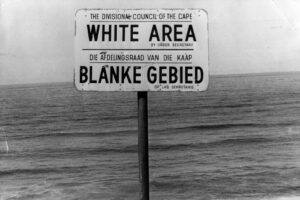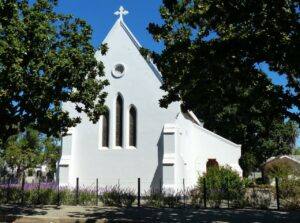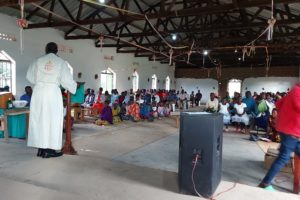Where has happened to our prophetic voice?
I have just seen an ad for Tom Wright and Michael Bird’s new book Jesus and the Powers. It wants to be “an urgent call for Christians everywhere to explore the nature of the Kingdom amid the political upheaval of the day.” It made me think of a blogpost I wrote five years ago, but never posted. Why? I was afraid. When I read it again a few days ago, I felt ashamed of myself. So here it goes…
The Church in the West has lost her prophetic voice. She has little to say about the world. She has retrieved into a calm and cozy spiritual corner. No, it’s not the world that tells her to be silent. She has convinced herself it is better to be silent.
Let me put it this way: the early Christians did not pick for no reason, as symbol for the church, a little ship in the wild ocean, with the cross as its mast. The ship symbolized Jesus’ followers, the cross their only hope, and the sea this stormy world. This ancient symbol played delicately on the memories of Christ and his disciples on the Sea of Galilee. It was an appropriate and moving symbol. Sadly though, today’s church in the West can hardly be pictured as a little ship in the open sea. She is laying safely anchored in a very comfortable and cozy harbour.
Why are we so fearful?
The reason we have abandoned our prophetic calling may be manifold. Most importantly we are afraid of controversy, of ruffling feathers and perhaps losing members. Everything these days seems to center on not losing members. That puts us in a very precarious spot. And yet these fears are fully understandable, even though they are (as an omnipresent dominating force) wholly unbiblical. Jeremiah, Amos, Isaiah, and Nahum, to name but a few would have had a hard time understanding us. Neither would they have bought the idea that we all live now in such a radically different world after the cross of Calvary, where their kind of worldly preaching is no longer needed. They sounded such a courageous clarion call about the state of the world – about its leaders and its people, their gross injustice, pride, cruelty, and greed – that was unmistakably political. They spared no-one. Just when Israel and Judah thought Amos was limiting his indictments to the surrounding nations he turned on them, in the name of Yahweh. He was not simply concerned for individual purity; preached against political, social and economic injustice on a national and international scale.
For very long a similar type of preaching was deemed perfectly normal and necessary in Christianity. On my book shelve is a bundle of sermons entitled Sermons that Shaped America published by Presbyterian and Reformed Publishing Company. It contains several sermons with a definite political thrust. Next to it stands another collection of sermons entitled Preaching in Hitler’s Shadow. Some of those sermons were so boldly political that they send shivers down my spine. Less than a century ago a course on homiletics in the Netherlands may still have included among its rubrics the theme of “political preaching” that a faithful reformed pastor may not ignore.
Back in the day…
During my youth growing up in South Africa, the mainline conservative churches spiritualized much of the Bible away. Very few dared to speak out openly against injustice in society. And injustice there was indeed, even though the distant West – so terribly self-righteously – blew it all out of all proportion. We were once told by our professor in seminary, how the famous Karl Barth asked a NG Kerk missionary, Rev. Nico Smit in Europe, whether he is really free to preach the Gospel in South Africa. The missionary responded: “Yes, of course, South Africa is a free country.” “That is not what I meant Nico…” Barth replied, “…are you also free to preach against apartheid?” Bingo! No, we were not. Not because of any law as such, but because we had normalized the abnormal, and muzzled the Bible in critical areas of everyday life. But that was okay so long as “personal salvation and holiness” received its proper emphasis in the sermon. Ministers, after all, should not engage in politics. The sad consequences of it all were that many white people turned wholesale against the church later on, and never forgave it for its cowardice. Large sections of the black church turned to a counter-gospel: that of liberation theology, sweeping through the land with a revolutionary fire; branding Jesus with an AK 47. But as my missions professor predicted so truly, such a Jesus will become redundant once the revolution was over.
Thankfully I also recall how some reformed ministers spoke out at a great cost. They were not popular for it. And while they lost some friends (and possibly also members) they also earned a lot of respect. History will always honour them. Sadly though it seems that the once mighty Dutch Reformed Church of South Africa is even more powerless today. If it ever followed the flow of culture in those days, it does so much more today… rendering itself powerless to be force for good. Did our saviour not say somewhere in John’s Gospel: “How can you believe in me, while you seek approval of men, but not the honour of God?” Hence the DRC’s utter helplessness today to stand up against political tyranny in the land and moral corruption in the church.

Here in North America, things aren’t much better. We suffer from the same lethal malady. Back in 1978 Alexander Solzhenitsyn already named the lack of courage as the most striking feature of Western society, when speaking at Harvard. Democracy and prosperity have taught us to live life looking in the rear-view mirror: at the polls and the markets. Nothing negatively impacting our popularity or prosperity may even so much as enter our minds. And so we die for a lack of vision.
For many in the reformed-evangelical branch of Christianity it is taboo to mention anything “political” from the pulpit. I am not thinking here of something like of supporting President Trump, or bashing him, for that matter. I am thinking of coming out clearly on issues threatening the very fabric our society and the future of mankind, not to mention the glory of God. A few traditionally popular issues may still be mentioned, like abortion, racism or even same-sex marriage. But seldom would you hear anyone speak on the massive migration crises, or on the evolving of a new arms-race and cold-war; on the ethics of our governments constantly forcing regime-change in distant countries, on the rape of our environment; on the spectre of identity politics; on the paralyzing fear for Islam, on the ugly face of ruthless crony capitalism; on the rapid erosion of liberty of speech; on the frightening impact of media propaganda, on the rise of Neo-Marxism, on the near extinction of Christianity in the Middle East (due to our reckless Western wars over there), or on the causes of our monstrous opioid crisis, to name but a few. Pastors rarely touch these topics
No doubt, this is a minefield…
Granted, a minister may not and should not speak on anything that he is not well-informed about, or when he is not very sure what God’s Word is saying about it. Neither is he called to voice his own opinions Sunday after Sunday, sounding like a running commentary on news events. But does God not have an opinion on all these things. Is this not his world! Or will he also say like us: “Just trust Me, for I am in full control”? Are we not his vice-regents and ambassadors in this world; stewards that must give an account to him when he returns.
Neither should God’s servant speak on these issues every Sunday, nor when his text does not allow for it, for we preach Christ and him crucified and not an earthly kingdom. But should the preacher consider all these themes taboo, or even worse, as unspiritual? Will we be able to look our posterity in the eyes telling them that we were afraid to speak on these things? “O yeah,” they will say, “and you really thought you were faithful? Wow!”
For sure there are pitfalls. A minister of the gospel must above all be an ambassador of Christ, a minister of reconciliation, a herald of peace. But how can he be any of that, in the Biblical sense of the word, if he is silent about the rise of evil? Does evil not conquer because good men do nothing, as Edmund Burke once said after the bloody French Revolution? And if speaking the truth becomes an act of treason during times of universal deceit (as George Orwell allegedly said), should the church look to the world for men with chests who will stand in the gap?
My own experience
Let me illustrate. Back in 2003 when war clouds were gathering over Iraq, and the White House was making its case for invading that country, I was waiting and hoping for a voice – any voice in Evangelicalism – to speak out clearly on what constitutes a Just War. The church had such a rich tradition on this topic. Sadly there was only a deafening silence here in Canada. In the US many came out boldly in favour of an American and British invasion. The only voice I heard at the time, calling for some caution, was that of the late Dr. RC Sproul. So when I felt compelled to preach a sermon “Shall We Go to War?” from I Timothy 2, I did so in fear and trembling. Some thought I was a bit crazy. Yet I could not forget the words of Rev. Victor Atallah of Middle East Reformed Fellowship in Cyprus, warning that a US-led invasion would hurt Middle Eastern Christians more than any in that region. His warnings proved to be tragically true. After all, the only clear result we have today from all the Western attempts to “bring democracy” to the Middle East, is the near extinction of Christianity in several countries over there.
And then, in the wake of the Charlie Hebdo terrorist attack in France in January 2015, God’s providence brought me to the Third Commandment, as summarized by our Heidelberg Catechism. I felt compelled by God’s Spirit to come out boldly against a widely publicized march in Paris, in which European leaders proclaimed: “We are Charlie!” Their slogan reverberated around the globe, implying that all of us Westerners are now loyal to Charlie Hebdo. How could I preach on the Third Commandment that night, simply ignoring the events in Paris? Were the Charlie Hebdo cartoons not known for the very worst form of blasphemy against our God ever published? I felt divinely called to speak out… and I did. A dear colleague in France later praised me for sermon and sent it to his friends.

While the vast majority of my parishioners were thankful for their pastor’s boldness, a handful was furious. That next week I was solemnly warned by a senior elder over coffee, never to “preach politics” again. He was clearly shaken by someone’s negative response. The matter was, of course, never put before the congregation, for they would have thought quite differently. Nevertheless, to make sure I understood him correctly I asked the brother: “Was the church in South Africa right to be silent on apartheid for so long?” He answered with an unequivocal yes. Dumfounded by his answer I tried once more: “And was the Danish church right to be silent when Hitler’s tanks rolled into their country?” Again the same answer. I was stunned. I thought by myself: “What about Bonhoeffer and the Confessing Church in Hitler’s Germany? Were they all misguided? And what about the Scottish Covenanters or even John the Baptist?” We could go on… What would Calvin think of this new form of Calvinism? Would he recognize it as his own legacy? I have read enough of his sermons to have had some clue!
A fatal mistake
Are we not making a fatal mistake? No-one may claim that touching on political issues should ever be done lightly. Nor should we fall into the snare of craving for a theocracy in Old Testament fashion. And please don’t speak about something when you are not absolutely sure about the available facts, or not being willing to be corrected. But surely, the gospel is not all about our souls and eternal salvation only? Did God not so love this world…? Will Jesus not come to judge the nations? Have we not become sleeping dogs and fearful watchmen? Is the root cause of it all not because we love our safe little harbour too much, and the next generation too little? (Edmund Burke also apparently said that the real social contract is not between the government and the people but between us and the next generation!)
And what will the next generation say of us? Not to mention the world! Will they ever associate our preaching with the two faithful witnesses of Revelation 11, whose bodies lay slain in the city that is called Sodom and Egypt, where our Lord was also crucified? Is it not time to set our sails to the wind of the Holy Spirit and to embark for the open seas again, preaching the full counsel of God? Have we not made Christianity entirely irrelevant?
The Holy Spirit drives out all fear and fills us with love and truth, and above all with courage. With love for our fellow human beings near and far, and with the truth of His Word. I mention this because a dear friend in Germany alerted me to the fact that there is a reason deeper than fear why we refrain from speaking out. Our lack of love! We ultimately do not care about those who will perish due to our silence. The Lutheran pastor Martin Niemöller said after the Second World War. “They first came for the socialists, and I did not speak out, because I was not a socialist. Then they came for the trade unionists, and I did not speak out, because I was not a trade-unionist. Then they came for the Jews, and I did not speak out, because I was not a Jew. And when they came for me there was no-one left to speak for me!”
Winston Churchill apparently once said about WWII that it could have been prevented had good men done more! Our choice is simple: we can either choose to inform and exhort one other, or we can take the safe and politically correct road, by avoiding sticky topics. But doing so, we may very well allow untold suffering and chaos to become our bitter and grim instructor.
The beauty of boldness
To illustrate what true courage may look like, please read Pastor Wang Yi of the Early Rain Church’s Declaration of Faithful Disobedience before he was recently arrested in Communist China. Or listen to Pastor Helmut Gollwitzer preaching to his flock in Berlin, on the day the Second World War broke out on September 3, 1939. His sermon was on the Lord’s Prayer. Gollwitzer continued: “In the coming days there will be a lot of cheap faith in God offered up, and there will be a lot of pagan faith in God even in our Christian churches. But truly, the only person who can trust completely in God is the person who can now bow before him…” (and not only pray for daily bread, but also for peace). “We have not earned this day’s bread, but rather this war with all its horrors. We have, each and every one of us, brought all this upon ourselves, and we richly deserve the consequences. Only that person may make the fourth petition (for our daily bread) who in the same breath makes also the fifth: And forgive us our guilt. If I may name but one sin, we have become very hardhearted. We all must accuse ourselves of having brought so much misery upon ourselves by allowing so much evil to happen while we watched unmoved, and now this evil threatens us”.
Or listen to the prophetic voice of the Right Reverend John Da Costa of Salisbury, officiating in the solemn memorial service after the 1978 downing of a public passenger plane by ZANU terrorists near Lake Kariba in Rhodesia. After the crash, the ZIPRA terrorists brutally killed the poor survivors. Listen to this Anglican preacher’s bold courage! I envy him. O may Jesus help me, for soon I shall stand before him. This man still believed in good and evil. He understood what Paul meant in Galatians 6 when he wrote: “I am crucified to the world and the world to me”. He sounds very much like those two brave witnesses of Revelation 11. May God’s peace remain with him and us forever!








